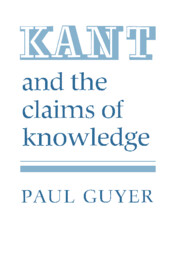Book contents
- Frontmatter
- Contents
- Acknowledgments
- Note on sources
- Introduction
- Part I Kant's early view
- Part II The transcendental deduction from 1781 to 1787
- Part III The principles of empirical knowledge
- 6 The schematism and system of principles
- 7 Axioms and anticipations
- 8 The general principle of the analogies
- 9 The first analogy: substance
- 10 The second analogy: causation
- 11 The third analogy: interaction
- Part IV The refutation of idealism
- Part V Transcendental idealism
- Afterword
- Notes
- Index of passages cited
- General index
6 - The schematism and system of principles
Published online by Cambridge University Press: 09 March 2010
- Frontmatter
- Contents
- Acknowledgments
- Note on sources
- Introduction
- Part I Kant's early view
- Part II The transcendental deduction from 1781 to 1787
- Part III The principles of empirical knowledge
- 6 The schematism and system of principles
- 7 Axioms and anticipations
- 8 The general principle of the analogies
- 9 The first analogy: substance
- 10 The second analogy: causation
- 11 The third analogy: interaction
- Part IV The refutation of idealism
- Part V Transcendental idealism
- Afterword
- Notes
- Index of passages cited
- General index
Summary
What is the schematism?
In his original transcendental theory of experience, Kant tried to demonstrate the objective validity of a priori categories of the understanding by directly demonstrating the role of the concepts of substance, causation, and interaction in the temporal organization of experience. For the Critique of Pure Reason, however, he attempted to separate the pure concepts of the understanding from the principles of temporal determination. The metaphysical deduction purported to derive the categories from the logical functions of judgment alone, and even though the premise that “all our knowledge is … subject to time” was placed at the head of the transcendental deduction in the first edition (A 99), this claim had no obvious role in the three methods for a transcendental deduction to which Kant devoted most of his effort during the 1780s. It had an explicit role only in the suggestion that the objective application of the categories is the necessary condition for making determinate empirical judgments even about inner sense or empirical self-consciousness. But since such an argument was barely hinted at in the final sections of the second-edition text, the major work of Kant's transcendental deduction remained to be done even after the chapter officially devoted to it.
- Type
- Chapter
- Information
- Kant and the Claims of Knowledge , pp. 157 - 182Publisher: Cambridge University PressPrint publication year: 1987



